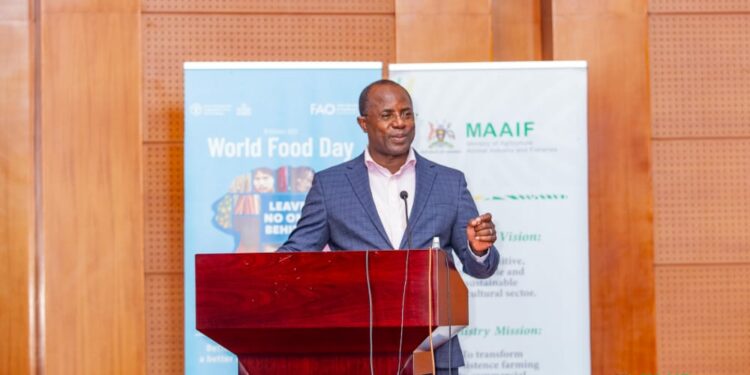On Monday while addressing the media about the coming World Food Day at the Media Center, the State Minister of Agriculture Fred Bwino Kyakulaga emphasised the urgent need to address the growing impact of climate change on Uganda’s food production systems.
While acknowledging strides in agricultural development, the minister warned that climate change is already posing significant risks to food security in the country.
“While we celebrate these achievements, we must also address the emerging challenges. Climate change poses a serious threat to food production, and its impacts are already being felt in the form of erratic weather patterns, prolonged droughts, and floods,” the minister noted.
He further outlined the government’s commitment to increasing investments in climate-smart agriculture, irrigation, and sustainable water use to mitigate the devastating effects of these environmental changes.
To bolster these efforts, the National Agricultural Research Organization (NARO) was praised for spearheading research into climate-resilient crops and those with enhanced nutritional value.
The minister pointed out the importance of such research in adapting Uganda’s agricultural systems to changing environmental conditions. “Our research institutions, led by NARO, have been instrumental in developing improved, climate-resilient crop varieties. These institutions ensure that our agricultural systems remain adaptive to challenges while providing food that meets the nutritional needs of our people.”
In his call to action, the minister urged farmers to adopt modern, sustainable agricultural practices to ensure long-term productivity and resilience. He also encouraged the private sector to continue investing in value addition and agro-processing. “Farmers, I urge you to embrace modern, sustainable agricultural practices. The private sector is encouraged to continue investing in value addition and agro-processing.
With food insecurity being closely linked to malnutrition, the minister also highlighted the critical need to tackle malnutrition, especially among vulnerable groups, including children and women. “We also need to address malnutrition, especially among vulnerable groups, such as children and women. The government will continue to promote the cultivation and consumption of nutritious food, ensuring that every Ugandan can lead a healthy and productive life,” he added.
The minister called for collective action to ensure that Uganda meets its food security goals. “On this World Food Day, I call upon all Ugandans to unite in our mission to achieve food security for everyone. Let us work together to promote nutrition-sensitive agriculture and food safety systems.”
As the country grapples with the growing threats posed by climate change, the minister’s address served as a reminder of the urgency of adopting comprehensive strategies to protect both the environment and the future of food security in Uganda.
Meanwhile, the 44th World Food Day is observed every year on 16th October. This day is not only a global commemoration but also a moment for countries to reflect on the progress they have made in the fight against hunger, food insecurity, and malnutrition.
In Uganda, despite the mushrooming industries, agriculture continues to play a pivotal role in the nation’s development, and the objectives of World Food Day align closely with Uganda’s national agenda for ensuring food security and improving livelihoods.
This year’s theme: “Right to Foods for a Better Life and a Better Future.” According to Minister Bwino, the theme reminds Ugandans that access to sufficient, safe, and nutritious food is not merely an aspiration but a fundamental human right. It also highlights the need for collaborative efforts between government, farmers, the private sector, civil society, and all Ugandans to ensure that every citizen has access to food that is essential for their health and well-being.
Do you have a story in your community or an opinion to share with us: Email us at editorial@watchdoguganda.com













